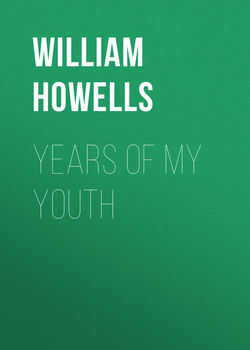Years of My Youth

Реклама. ООО «ЛитРес», ИНН: 7719571260.
Оглавление
Howells William Dean. Years of My Youth
I
I
II
III
IV
V
VI
VII
VIII
IX
X
XI
II
I
II
III
IV
V
VI
VII
VIII
IX
X
XI
XII
XIII
XIV
III
I
II
III
IV
V
VI
VII
VIII
IX
X
XI
IV
I
II
III
IV
V
VI
VII
VIII
IX
X
XI
XII
XIII
XIV
Отрывок из книги
IT is hard to know the child’s own earliest recollections from the things it has been told of itself by those with whom its life began. They remember for it the past which it afterward seems to remember for itself; the wavering outline of its nature is shadowed against the background of family, and from this it imagines an individual existence which has not yet begun. The events then have the quality of things dreamt, not lived, and they remain of that impalpable and elusive quality in all the after years.
I can reasonably suppose that it is because of the mixture of Welsh, German, and Irish in me that I feel myself so typically American, and that I am of the imaginative temperament which has enabled me all the conscious years of my life to see reality more iridescent and beautiful, or more lurid and terrible than any make-believe about reality. Among my father’s people the first who left Wales was his great-grandfather. He established himself in London as a clock and watch maker, and I like to believe that it is his name which my tall clock, paneled in the lovely chinoiserie of Queen Anne’s time, bears graven on its dial. Two sons followed him, and wrought at the same art, then almost a fine art, and one of them married in London and took his English wife back with him to Wales. His people were, so far as my actual knowledge goes, middle-class Welsh, but the family is of such a remote antiquity as in its present dotage not to know what part of Wales it came from. As to our lineage a Welsh clergyman, a few years ago, noting the identity of name, invited me to the fond conjecture of descent from Hywel Dda, or Howel the Good, who became king of Wales about the time of Alfred the Great. He codified the laws or rather the customs of his realm, and produced one of the most interesting books I have read, and I have finally preferred him as an ancestor because he was the first literary man of our name. There was a time when I leaned toward the delightful James Howell, who wrote the Familiar Letters and many books in verse and prose, and was of several shades of politics in the difficult days of Charles and Oliver; but I was forced to relinquish him because he was never married. My father, for his part, when once questioned as to our origin, answered that so far as he could make out we derived from a blacksmith, whom he considered a good sort of ancestor, but he could not name him, and he must have been, whatever his merit, a person of extreme obscurity.
.....
My father now began to read medicine, but during the course of a winter’s lectures at Cincinnati (where he worked as a printer meanwhile), his health again gave way and he returned to Martin’s Ferry. When I was three years old, my grandmother Dean’s eldest brother, William Dock, came to visit her. He was the beloved patriarch of a family which I am glad to claim my kindred and was a best type of his Pennsylvania-German race. He had prospered on through a life of kindness and good deeds; he was so rich that he had driven in his own carriage from Harrisburg, over the mountains, and he now asked my father to drive with him across the state of Ohio. When they arrived in Dayton, my father went on by canal to Hamilton, where he found friends to help him buy the Whig newspaper which he had only just paid for when he sold it eight years later.
These uncles had grown up in a slave state, and they thought, without thinking, that slavery must be right; but once when an abolition lecturer was denied public hearing at Martin’s Ferry, they said he should speak in their mother’s house; and there, much unaware, I heard my first and last abolition lecture, barely escaping with my life, for one of the objections urged by the mob outside was a stone hurled through the window, where my mother sat with me in her arms. At my Uncle William’s house in the years after the Civil War, my father and he began talking of old times, and he told how, when a boy on a keel-boat, tied up to a Mississippi shore, he had seen an overseer steal upon a black girl loitering at her work, and wind his blacksnake-whip round her body, naked except for the one cotton garment she wore. “When I heard that colored female screech,” he said, and the old-fashioned word female, used for compassionate respectfulness, remains with me, “and saw her jump, I knew that there must be something wrong in slavery.” Perhaps the sense of this had been in his mind when he determined with his brothers that the abolition lecturer should be heard in their mother’s house.
.....